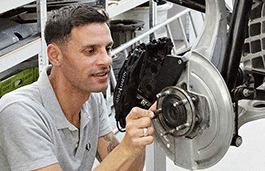Search
Renewable Energy Engineering MSc
Study level: Postgraduate
This course is designed for students who are interested in supporting the renewable energy industry, as it continues its rapid growth to tackle the severe issues posed by climate change and to respond to the UN Sustainable Development Goals.
Course features
Year of entry
2024-25
Location
Coventry University (Coventry)
Study mode
Full-time
Part-time
Sandwich
Duration
1 year full-time
2 years part-time
2 years sandwich
Course code
EECT068
Start date
September 2024
January 2025
Course overview
You will have the opportunity to advance your engineering proficiency and develop new skills and knowledge.
- Through the exploration of current and emerging technologies and applications for renewable energy, successful completion of this course should prepare you to make significant contributions to your profession, the economy, and society.
- You will have the option to apply for a ‘work placement’ opportunity2, designed to further develop your skills and knowledge with the aim of maximising your employability prospects. See modules for more information.
Joint Top Modern University for Career Prospects
Guardian University Guide 2021 and 20225 QS Stars for Teaching and Facilities
QS Stars University RatingsTop 5 UK Student City in England (Coventry)
QS Best Student Cities Index 2024Why you should study this course
This course aims to address the need for skilled energy engineers. You will have the opportunity to develop a systematic understanding of knowledge, analytical techniques and research skills related to an MSc in Renewable Energy Engineering.
- Embedded in the course is a Chartered Management Institute (CMI) Global Professional Development Entrepreneurial Practice module which aims to provide you with essential business management experience and transferable skills.
- Coventry University has a strong portfolio of industry-related research, which currently includes the Institute for Advanced Manufacturing and Engineering (AME) in collaboration with Unipart Manufacturing Group and The Institute for Future Transport and Cities.
- We aim to provide several field trips to UK sites2. Previous students have undertaken trips to waste and energy plants, wind farms, a battery manufacturing centre and hydropower plant.
Accreditation and professional recognition
This course is accredited1 and recognised by the following bodies:
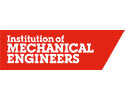
Institution of Mechanical Engineers (IMechE)
This degree is accredited by the Institution of Mechanical Engineers (IMechE) up to and including the 2025 intakes under licence from the UK regulator, the Engineering Council. Accreditation is a mark of assurance that the degree meets the standards set by the Engineering Council in the UK Standard for Professional Engineering Competence (UK-SPEC). An accredited degree will provide you with some or all of the underpinning knowledge, understanding and skills for eventual registration as an Incorporated (IEng) or Chartered Engineer (CEng). Some employers recruit preferentially from accredited degrees, and an accredited degree is likely to be recognised by other countries that are signatories to international accords.
Students completing an IMechE accredited degree are deemed to have met part or all of the academic requirements for registration as a Chartered or Incorporated Engineer and are in a strong position to move on to achieve professional engineering status after a period of initial professional development in industry.
The accredited MSc will meet, in part, the exemplifying academic benchmark requirements for registration as a Chartered Engineer. Accredited MSc graduates who also have a BEng (Hons) accredited for CEng will be able to show that they have satisfied the educational base for CEng registration.
It should be noted that graduates from an accredited MSc programme, that do not also have an appropriately accredited Honour’s degree, will not be regarded as having the exemplifying qualifications for professional registration as a Chartered Engineer with the Engineering Council; and will need to have their qualifications individually assessed through the Individual Case Procedure if they wish to progress to CEng.

Chartered Management Institute (CMI)
As part of this course you will undertake a professional development module which is currently accredited by the Chartered Management Institute (CMI) for the 2024-25 intake. Upon successful completion of the module, you will gain the CMI Level 7 Certificate in Strategic Management and Leadership Practice at no additional cost.
Coventry University’s accreditation with CMI is currently ongoing for the relevant modules and is regularly reviewed and monitored by the CMI through their quality systems. Whilst Coventry University anticipates that these reviews will continue to be successful, if they were to be unsuccessful, the relevant module in this course would no longer be accredited and we would notify applicants and students of this change as soon as possible.
IMechE Membership Partner
We are a Membership Partner with the Institution of Mechanical Engineers (IMechE).
Working in collaboration with the IMechE we aim to ensure our engineers and technical teams meet industry-recognised standards of engineering excellence.
We are committed to the professional development of everyone within our organisation and recognise that professional registration and recognition are crucial in helping our employees and business grow and excel.
What you'll study
This course will provide you with opportunities to develop and critically analyse technologies and applications for renewable heat, power, and transportation.
You will have the chance to learn how to apply your engineering knowledge to address the requirement for cost-effective carbon reduction solutions and appraise the global socio-economic challenges associated with renewable energy.
This course includes a mandatory Entrepreneurial Practice Professional Development module developed in collaboration with the Chartered Management Institute.
With work placement pathway
The ‘With work placement’ opportunity2 enables you to apply in semester 1 for an optional work placement of up to 12 months, extending the duration of your master’s to 24 months. The placement provides an opportunity for you to develop expertise and experience in your chosen field with the aim of enhancing your employability upon graduation. The work placement would take place in semesters 3, 4 and 5.
Please note that the optional placement modules incur an additional tuition fee of £4,000. Placement opportunities may also be subject to additional costs, visa requirements being met, subject to availability and/or competitive application. Work placements are not guaranteed but you will benefit from the support of our Talent Team in trying to find and secure an opportunity. Please note that the optional placement modules incur an additional fee of £4,000. Find out more about the work placement option.
We regularly review our course content, to make it relevant and current for the benefit of our students. For these reasons, course modules may be updated.
How you'll learn
Teaching will be supported by academics who are researchers in the areas of alternative transportation and solar, wind, hydro and bio energy. Please note that staff are subject to change. Teaching activities are designed to align with several of the university's research centres, including the Centre for Fluid and Complex Systems and the Centre for Future Transport and Cities.
You will study two taught semesters and one project semester over the course of the year. For taught semesters, in a typical week your contact hours will be divided amongst personal tutorials, medium group teaching in tutorial sessions, labs and workshops activities as well as large group teaching in lectures.
The number of contact hours may vary from semester to semester, however, on average, it is likely to be around 12 contact hours per week in the taught semesters. You will also be expected to undertake significant self-directed study approximately 35 hours each week, depending on the demands of individual modules. Your project-based semester will be supervisor supported, self-directed study in the region of 45 hours per week as well as supervisor meetings around one hour per week and optional workshops supporting your project which can add up to 10 additional hours across your project semester.
As an innovative and enterprising institution, the university may seek to utilise emerging technologies within the student experience. For all courses (whether on-campus, blended, or distance learning), the university may deliver certain contact hours and assessments via online technologies and methods.
Since COVID-19, we have delivered our courses in a variety of forms, in line with public authority guidance, decisions, or orders and we will continue to adapt our delivery as appropriate. Whether on campus or online, our key priority is staff and student safety.
This course can be studied on a full-time or part-time basis. Whilst we would like to give you all the information about our part-time offering here, it is tailored for each course each year depending on the number of part-time applicants. Therefore, the part-time teaching arrangements vary. Please request information about studying this course part-time.
Assessment
This course will be assessed using a variety of methods which will vary depending upon the module. Assessment methods include formal examinations, coursework, tests, essays, practical or project work, group work and presentations.
The Coventry University Group assessment strategy ensures that our courses are fairly assessed and allows us to monitor student progression towards the achieving the intended learning outcomes. Assessments may include exams, individual assignments or group work elements.
International experience opportunities
The university is committed to providing a global educational experience2, which is reflected throughout the teaching experience. The course has previously recruited diverse international graduates and promotes multicultural experiences.
Extended supply chains and energy security in the context of sustainability and energy management will be considered throughout the course. Case studies for both developing and developed countries will be an area of focus, with teaching activities supported by international research projects. Group work and guest lectures (subject to availability) from visiting international academics will be used to provide you with the opportunity to develop intercultural skills and experience.
Entry requirements
Typical offer for 2024/25 entry.
Fees and funding
2024/25 tuition fees.
| Student | Full-time | Part-time |
|---|---|---|
| UK, Ireland*, Channel Islands or Isle of Man | £11,200 | £4,000 (Work placement option additional fee) | Request fee information |
| EU | £11,200 | £4,000 (Work placement option additional fee) per year with EU Support Bursary** £20,050 | £4,000 (Work placement option additional fee) per year without EU Support Bursary** |
Not available |
| International | £20,050 | £4,000 (Work placement option additional fee) | Not available |
For advice and guidance on tuition fees3 and student loans visit our Postgraduate Finance page and see the university's Tuition Fee and Refund Terms and Conditions.
We offer a range of International scholarships to students all over the world. For more information, visit our International Scholarships page.
Tuition fees cover the cost of your teaching, assessments, facilities and support services. There may be additional costs not covered by this fee such as accommodation and living costs, recommended reading books, stationery, printing and re-assessments should you need them.
The following are additional costs not included in the tuition fees:
- Any optional overseas field trips or visits: £400+ per trip.
- Any costs associated with securing, attending or completing a placement (whether in the UK or abroad).
*Irish student fees
The rights of Irish residents to study in the UK are preserved under the Common Travel Area arrangement. If you are an Irish student and meet the residency criteria, you can study in England, pay the same level of tuition fees as English students and utilise the Tuition Fee Loan.
**EU Support Bursary
Following the UK's exit from the European Union, we are offering financial support to all eligible EU students who wish to study an undergraduate or a postgraduate degree with us full-time. This bursary will be used to offset the cost of your tuition fees to bring them in line with that of UK students. Students studying a degree with a foundation year with us are not eligible for the bursary.
Facilities
Our aim is to offer you sector-leading facilities4:
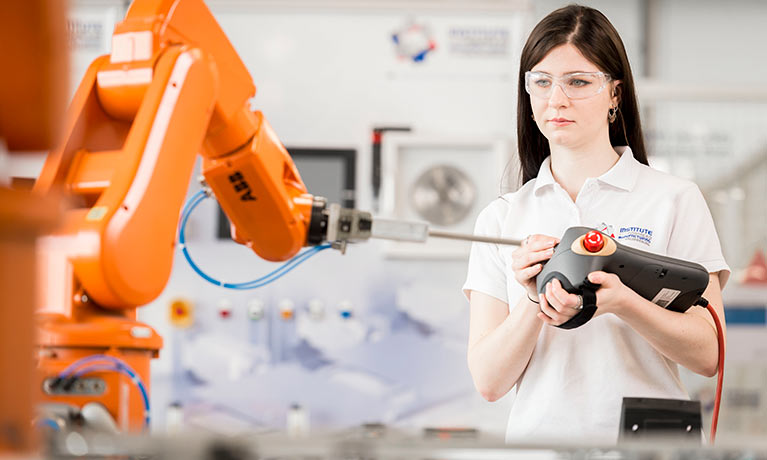
Faculty on the factory floor
AME brings together academia, industry, and research and development in a ‘live’ manufacturing environment. Our collaboration with Unipart gives you the opportunity to work with some of the most talented engineering professionals in the UK.
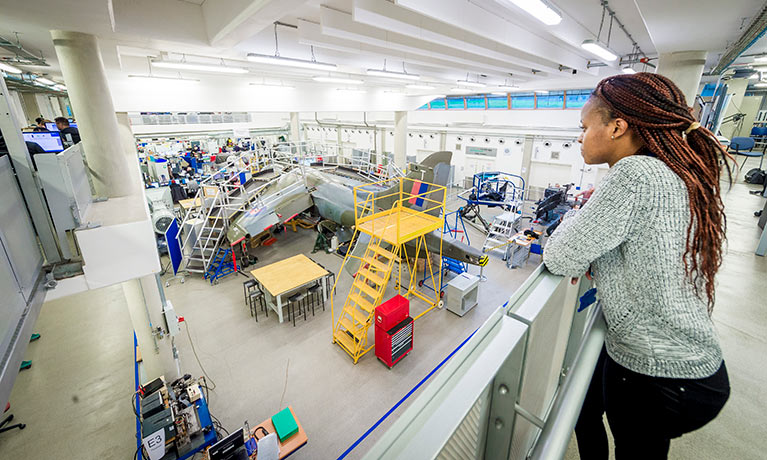
High Performance Engineering Centre (HPEC)
Situated on the ground floor of our Engineering and Computing Building, the centre houses flight and driving simulators, a chassis design assembly and test facility, wind tunnels and a fleet of CNC manufacturing machines.
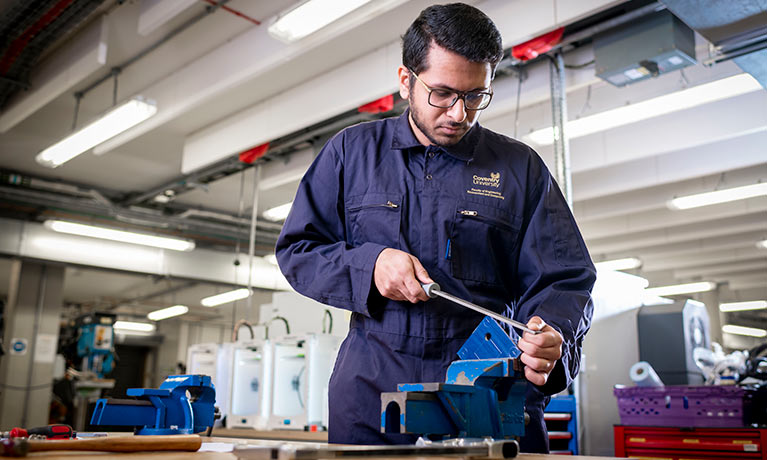
Metals Workshop
Participate in technical work in a hands-on way. The workshop includes lathes, milling machines, fabrication equipment for sheet metal work, CNC machines, work benches, welding lines and a fitting assembly area.
Careers and opportunities
Upon successful completion of this course, you will be able to:
- Select and apply appropriate systematic analysis methods to critically evaluate and solve complex renewable energy engineering problems.
- Analyse different energy resources and conversion processes using analytical modelling, experimental techniques and numerical simulations.
- Critically access the use of renewable energy systems to mitigate climate change and improve the environment and social welfare.
- Make and justify decisions for selecting and optimising renewable energy products and systems based on technical, environmental, economic, risk and social criteria.
- Develop innovative solutions to meet the current global sustainability and renewable energy challenges.
Globally, the total renewable energy capacity has quadrupled in the last ten years. In 2015, $286 billion was invested in renewables and, for the first time, more than half of all added power generation came from renewables. However, significant increases in growth are still needed if global renewable energy targets are to be achieved.
Renewable energy is set to expand even further as the UK aims to bring all greenhouse gas emissions to net zero by 2050. Renewable energy also has a particularly important role to play in providing crucial services in developing countries to tackle poverty and support sustainable economic growth.
Where our graduates work
There are many wide-ranging engineering jobs that have requirements for skills in energy systems and sustainability. Graduates may seek positions with energy technology manufacturers and operators, some may start their own companies, others could become energy consultants, and many could go into more traditional aerospace, mechanical and automotive engineering jobs.
Graduate Immigration Route visa
Based on current information from the UK Government, international students whose study extends beyond summer 2021 may be eligible for a visa under the UK Government’s Graduate Immigration Route, which will enable students to stay and work, or look for work, in the UK at any skill level for up to two (2) years. Check the most up to date guidance available to check your eligibility and any updates from the UK Government before making an application or enrolment decision.
How to apply
You may also like
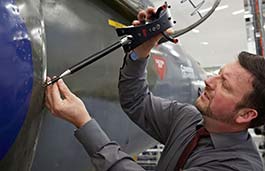
Aerospace Engineering MSc
